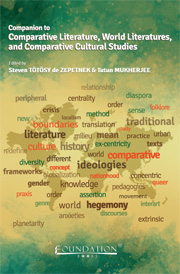Book contents
- Frontmatter
- Contents
- Introduction to the Companion to Comparative Literature, World Literatures, and Comparative Cultural Studies
- PART 1 Theories of Comparative Literature, World Literatures, and Comparative Cultural Studies
- PART 2 Comparative Literature in World Languages
- African Literatures as World Literatures
- Comparative Literature in Arabic
- Comparative Poetics in Chinese
- Comparative Literature in French
- Comparative Literature in German
- Comparative Literature in Iberian Spanish and Portuguese
- Comparative Literature in Indian Languages
- Comparative Literature in Italian
- Comparative Literature in Latin American Studies
- Comparative Literature in Russian and in Central and East Europe
- Comparative Literature in the United States
- PART 3 Examples of New Work in Comparative Literature, World Literatures, and Comparative Cultural Studies
- PART 4 Multilingual Bibliography of Books in Comparative Literature, World Literatures, and Comparative Cultural Studies
- Index
African Literatures as World Literatures
from PART 2 - Comparative Literature in World Languages
Published online by Cambridge University Press: 05 April 2014
- Frontmatter
- Contents
- Introduction to the Companion to Comparative Literature, World Literatures, and Comparative Cultural Studies
- PART 1 Theories of Comparative Literature, World Literatures, and Comparative Cultural Studies
- PART 2 Comparative Literature in World Languages
- African Literatures as World Literatures
- Comparative Literature in Arabic
- Comparative Poetics in Chinese
- Comparative Literature in French
- Comparative Literature in German
- Comparative Literature in Iberian Spanish and Portuguese
- Comparative Literature in Indian Languages
- Comparative Literature in Italian
- Comparative Literature in Latin American Studies
- Comparative Literature in Russian and in Central and East Europe
- Comparative Literature in the United States
- PART 3 Examples of New Work in Comparative Literature, World Literatures, and Comparative Cultural Studies
- PART 4 Multilingual Bibliography of Books in Comparative Literature, World Literatures, and Comparative Cultural Studies
- Index
Summary
Abstract: In his article “African Literatures as World Literatures” Isaiah Ilo proposes alternative criteria for language choice in modern African literatures via the example of drama. The two most influential constructs on the language question are Fanon's essentialism that rejects Western languages as instruments of subjugation and Achebe's hybrid approach which entails subversion of the foreign languages by infusing them with African verbal characteristics. Ilo argues that present reality rather than past experience should influence decision about language choice for modern African literatures. The ideal criteria should consist of practical consideration for audience needs, rather than a romantic fixation with the colonial experience that requires from writers rare or inaccessible skills in the use of mother tongue or usage of local lore to indigenize a foreign tongue.
Introduction
Linguo-aesthetics is the term by which I identify the subject known as the language issue in African literature. The concept has been a field of scholarly discourse since the 1960s and has materialized a body of prescriptive and descriptive literature on language aesthetics in African literature and literary creativity. The representatives of the two leading, albeit divergent ideas in the field, are Ngũgĩ wa Thiong'o and Chinua Achebe. The relationship between language and literature is so central in African writing that it constitutes the main aesthetic and critical standard. Considering the growing body of knowledge on the subject, it may be inappropriate to continue to recognize this field merely as “the language question,” “the language problem,” “the language factor,” or “the language debate.”
- Type
- Chapter
- Information
- Companion to Comparative Literature, World Literatures, and Comparative Cultural Studies , pp. 219 - 230Publisher: Foundation BooksPrint publication year: 2014



